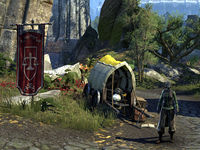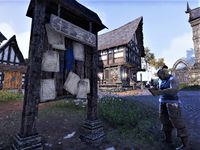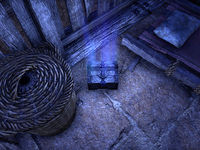Online:Making Money
Many elements in The Elder Scrolls Online require gold as a means of progression. While you invest in mount training, inventory slots, reallocating character skills and attributes, or even trading with vendors, the pile-up of costs end up with you needing a lot of money. Thankfully, there are a lot of ways to make money in The Elder Scrolls Online. This guide will help you make a small fortune out of your enjoyment of the game.
There are a few main avenues for making money in The Elder Scrolls Online: farming, trading, crafting, and thievery. Your profitability through these different means will mainly depend on your in-game progression, though personal preference and general craftiness will allow you to optimize accordingly. It is worth noting that ESO Plus may add more convenience to some of these methods, such as alleviating inventory stress, granting you access to premium areas and dungeons, or marginally speeding up the process of leveling up your money-making skills; it is by no means a requirement, however it should be considered depending on your money-making preference(s).
Do note that DLC will also be mentioned throughout this guide, and will be marked with their respective DLC markers. In many cases, they serve as convenience, but some (but not all) money methods may require DLC— if it does, a Crown Store ![]() logo will be positioned in the sub-header.
logo will be positioned in the sub-header.
Farming[edit]

In a general sense, Farming (or grinding) is the repetition of certain tasks in order to gain a certain reward; this can be gear, mats, or even gold. Note that Farming alone won't get you a lot of money in the early game— especially if you're starting out— so it is recommended (not required) to level-grind until you're able to farm effectively. Here are some general tips:
- Farming high-level mobs (distinguished by a unique Difficulty bar
 ) can grant a steady supply of gold.
) can grant a steady supply of gold.
- Repeatedly defeating certain bosses (especially those in dungeons) can net you high-level gear which you can sell for profit.
- If you ever run out of inventory space (and lack an Assistant
 ), pay attention to the value of an item before tossing it: some white-grade gear and items have a 0 gold cost, and are worth tossing over a gear of any other color.
), pay attention to the value of an item before tossing it: some white-grade gear and items have a 0 gold cost, and are worth tossing over a gear of any other color.
If you have access to DLC-exclusive Zones or Dungeons, either by direct purchase or having ESO Plus ![]() , you can farm the areas for their exclusives and build a client base from selling items inaccessible to other players.
, you can farm the areas for their exclusives and build a client base from selling items inaccessible to other players.
Group Play[edit]

Grouping up with other players allows you to farm more efficiently, as there will be multiple people doing the same tasks as you. This is beneficial for class archetypes that facilitate group playstyles, such as Healers and Tanks, as it allows them to effectively grind without needing to sacrifice utility for damage.
The main areas of group play, outside of Dungeons and Trials, are Craglorn (for PvE) and Cyrodiil (for PvP).
Farming in Craglorn is very popular due to many of its zones being instanced— that is, everyone will be able to get drops from mobs, as opposed to non-instanced areas where only a single drop is available to everyone. Zone chats are full of group requests (though you will need to learn the zone abbreviations), so it can be relatively easy to find a group depending on your playstyle.
Farming in Cyrodiil has the potential to grant you exclusive items, such as those purchased with Alliance Points; you can then sell these items elsewhere. Outside of killing opposing alliance members, you can farm mobs and bosses in the Imperial City for Tel Var Stones ![]() . One of the quickest ways to turn Tel Var Stones into gold is to purchase Waxed Apothecary's Satchels from your alliance's Tel Var General Merchant. The satchels hold a random assortment of Reagents that can be sold to other players for gold.
. One of the quickest ways to turn Tel Var Stones into gold is to purchase Waxed Apothecary's Satchels from your alliance's Tel Var General Merchant. The satchels hold a random assortment of Reagents that can be sold to other players for gold.
Instanced zones are built around group play, so make sure you can deal and tank enough damage if you decide to try to farm them solo.
Nirncrux[edit]
One of the most highly sought after materials for Crafters (aside from certain Crafting Motifs and Tannins), Nirncrux is a Trait material found only in Craglorn. Its Trait, Nirnhoned, can only be obtained normally through completing a one-time quest in the zone, so selling gear with the trait material is almost always a profitable venture.
The weapon trait, Potent Nirncrux, easily sells for well over 25k for a single piece, and Nirnhoned weapons can go for 50k or more on market. The armor trait, Fortified Nirncrux, sells at a modest 5k in comparison, with gear selling in the 5-25k range, if not lower in some instances. As the process towards getting Nirnhoned traits is arduous, it may be beneficial to directly sell the Nirncrux you obtain.
As Nirnhoned trait items are obtained as a random-chance quest reward, you will need to either buy Nirnhoned pieces from the market or do the associated questline on multiple characters. This can be a time and money sink, especially when you're starting off. It is highly recommended to research Nirnhoned traits early on, as research time ramps up considerably as more and more research is completed. Leveling the respective Research skill, using Instant All Research scrolls (or similar), or having ESO Plus ![]() may relieve some of that tension. Nevertheless, there are roughly 20 gear types in the game, so the profits will add up once you have the traits researched.
may relieve some of that tension. Nevertheless, there are roughly 20 gear types in the game, so the profits will add up once you have the traits researched.
You can maximize your collection output of Nirncrux by grabbing the Plentiful Harvest perk.
Trading[edit]
Trading is often seen as the end process of most money-makers, where you try to grab highly sought-after mats, gear, or other curios to sell to other players. This isn't limited to just Farming: efficient Crafting skills can score you a commission from someone who requires a certain type of gear, and highly sought-out recipes and motifs can be stolen from citizens and Laundered for clean sales.
Though vendors are generally a more convenient way of gaining instant funds, you can get a better price selling certain items directly to other players. Selling to other players, however, will require some knowledge about the fluctuating market.
- First and foremost, having a general knowledge of the asking price for goods is integral for successful Trading. Add-ons make obtaining such knowledge easier; if you refuse to download unofficial mods, however, helpful types in zone chat may be able to give you an item's trading data if you link an item and ask.
- You can either directly trade with a player by meeting up at the same place, or you can send an item to them using the CoD (Cash on Delivery) feature in your Mail. Note that you will need to pay postage, which will not get refunded if someone declines a package.
- If you are incapable of selling an item directly to other players, however, you can join a Trading Guild. There are some fees associated with posting an item to the Guild Trader (1% from listing and an additional 7% Guild Cut), but it is a viable option if you can't find buyers on your own.
Crafting[edit]
Crafting is a very-accessible money-maker to all and requires only a small investment in perks to turn a profit: just craft what you find and sell it to vendors or players. As you roam Tamriel and beyond, you can see multiple types of harvest nodes for the different types of crafts; if you want to invest in all of the crafting professions, harvest any and all crafting nodes you encounter.
- When refining materials there is a chance to obtain a gem or other materials like tannin. This must be balanced against selling to crafters who would prefer the raw materials themselves and would pay more than the value of the gem.
- Certain Skills in a Craft's respective Skill Tree can increase the odds of obtaining these items.
- Make sure to do Crafting Writs regularly, as completion of them will net you both gold and crafting mats.
- If you are running out of inventory space and need to get rid of mats through a vendor, think about whether that stack of mats would net more profit than a piece of gear. If the gear price is more than the cost of the mats used (including Style Materials, if applicable), it is worth making the item and selling it.
Crafting Writs[edit]
Crafting Writs are Crafting dailies that provide you with gold, mats, sellable or deconstructable items, and sometimes even recipes that are used in your particular craft. This can give a steady stream of gold daily, which goes from negligible to substantial as your crafter levels up. Upon completion of a Crafting daily, you will receive a Crafting Coffer, which may provide you mats outright or a Survey: a specialized Treasure map that points you to crafting mats instead of Treasure chests.
Once you reach max level in a particular Crafting skill, you may get Master Writs at a seemingly-random rate from your daily Crafting Coffers. These specialty Writs require a singular item, but crafted with specific trait, style, set, and grade.
The item specifications are indiscriminate of owned DLC, so you are likely to get styles or sets that are normally inaccessible to you. The former can be alleviated by buying Style Motifs (either through Guild Traders or direct from other players), but the latter will require you to have a friend or guild member that has a particular crafting station attuned to the gear set you require.
When you complete Master Writs, you are paid in Writ Vouchers ![]() , which are a Crafting-exclusive currency that can buy exclusive items. Like Tel Var General Merchants exchange goods for Tel Var Stones, Mastercraft Mediators exchange items for Writ Vouchers. Most of these goods are associated with Crafting, such as Crafting Stations, but others can be used for general use, like Storage.
, which are a Crafting-exclusive currency that can buy exclusive items. Like Tel Var General Merchants exchange goods for Tel Var Stones, Mastercraft Mediators exchange items for Writ Vouchers. Most of these goods are associated with Crafting, such as Crafting Stations, but others can be used for general use, like Storage.
Jewelry Crafting  [edit]
[edit]
Jewelry Crafting is the simplest crafting skill to start leveling, due to the fact that it uses no Style Materials. Its main caveat, however, is the fact that it requires the Summerset Chapter ![]() to use, even after its respective skill line is unlocked. Jewelry traits can also be relatively inaccessible to obtain in lower levels without trading with other players, especially if you are newly starting off.
to use, even after its respective skill line is unlocked. Jewelry traits can also be relatively inaccessible to obtain in lower levels without trading with other players, especially if you are newly starting off.
Nevertheless, Jewelry Crafting has the shortest upgrade line of the other crafting skills, and has the potential to be the most lucrative— its Master Writs have the potential to grant the most Writ Vouchers, which opens up many Trading opportunities. It is a crafting line that has its Traits scattered across many of ESO's activities; this incentivizes players to explore different ways of play, which allows it to seamlessly pair up with different money-making techniques.
- Bloodthirsty jewelry and trait materials are rewards in weekly Trials quests and coffers.
- Harmony jewelry is found in Undaunted chests, and trait materials are found in daily dungeon finder rewards.
- Triune jewelry drops in Cyrodiil Dailies, and the trait material is purchased by war researchers.
Using Alts[edit]
It is possible to become an expert in all forms of crafting, but only at the loss of skill points for use in weapon and armor skills. Unless you are roleplaying a crafter, this inhibits your freedom to build a character; you can, however, make a secondary character (also known as an Alt) whose use is to make maximum use of all the resources you find by being an expert crafter.
If you make other players aware that you are a high-level crafter, they may come to you to craft better items for them, establishing a market base where they will bring you resources to craft in return for a reasonable profit-margin on the resulting goods.
|
As crafting is leveled by processing and creating items, rather than gathering, having your main gather materials for your alts won't take any inspiration or experience away from them. Do note that all materials scale based on both character level and crafting level, and survey materials do half-and-half. As an example: if your gatherer has Level 1 in the gathering skill but are Level 50 (and have a Champion ranking of ![]() 160 or higher), the mats they'll find will be both max and minimum level; likewise, if your gatherer has maxed their gathering skill, but is under Level 15, their mats will also be max and minimum level.
160 or higher), the mats they'll find will be both max and minimum level; likewise, if your gatherer has maxed their gathering skill, but is under Level 15, their mats will also be max and minimum level.
It is highly recommended to get the Plentiful Harvest perk on your gatherer, to make non-survey gathering sessions easier.
Thievery[edit]
Theft can be quite lucrative for the light-fingered, as one can pass through a city, looting all containers and picking all pockets, and make it out with Treasures that fetch between 40 and 1500 Gold. Due to their Stolen status, however, you cannot sell them to normal merchants. This means that you will need to turn them over to Fences: special merchants found in every Outlaws Refuge.
With zero points in the Legerdemain skill line, you can make between 2 to 75k Gold on a single character daily.
- Be careful not to pick up too high a bounty, as it will completely offset your gains if you get caught and reprehended.
- Stay away from Guards until it's gone. Bounties depreciate over time, even if that character's offline.
- It's highly recommended to invest at least a point in Trafficker from the Legerdemain skill line, as it doubles your fencing amount.
- Another helpful skill to invest into is Light Fingers, which increases your Pickpocket chance.
- You are likely to pick up a number of other items that you can launder and then sell, such as recipes and motifs.
If you have access to Champion points, there are a few perks in the Craft tree that may improve your looting experience— most notably, Cutpurse's Art, which increases your high-quality loot chance, and Infamous, which increases Fenced items' value by 25%.
Thieves Troves  [edit]
[edit]
A feature added with the Thieves Guild DLC ![]() , Thieves Troves are glowing, lootable containers scattered throughout Tamriel. Like with other containers, they have the potential to provide a wide assortment of items, but they may also contain contraband, Edicts, and other treasures within them. Some of these items can net you a nice profit, either by Fencing them directly or Laundering them for Trading.
, Thieves Troves are glowing, lootable containers scattered throughout Tamriel. Like with other containers, they have the potential to provide a wide assortment of items, but they may also contain contraband, Edicts, and other treasures within them. Some of these items can net you a nice profit, either by Fencing them directly or Laundering them for Trading.
Access to this feature requires you to join the Thieves Guild, which unlocks the Finders Keepers passive. The skill line also provides a small suite of skills that assist with profits in illegal trade, though most of them only provide getaways for when you get caught. A particular skill to note is Haggling, which increases the sale of goods to Fences up to 10% more.
Note that you cannot level up the Thieves Guild line any further if you end up losing ownership of the Thieves Guild DLC; once you join the guild and gain its relative passive, however, you are still able to obtain the troves.
Vulkhel Guard Grind[edit]
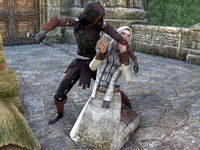
If you do not mind murdering civilians (and collecting a hefty bounty in the process), clearing Vulkhel Guard of its Temple Acolytes is a highly-effective way of collecting treasures (especially if you need them to complete Larceny ![]() or Blackfeather Court
or Blackfeather Court ![]() quests). If you are a member of the Dark Brotherhood
quests). If you are a member of the Dark Brotherhood ![]() , the Blade of Woe passive (alongside the Shadowstrike perk) will make this process incredibly easy. Using Stealth-related perks, classes, or gear will also make it harder for you to be detected, keeping you from attracting Guards or any other undesirable NPCs that will attack you on sight.
, the Blade of Woe passive (alongside the Shadowstrike perk) will make this process incredibly easy. Using Stealth-related perks, classes, or gear will also make it harder for you to be detected, keeping you from attracting Guards or any other undesirable NPCs that will attack you on sight.
There are quite a few NPCs to be wary of:
-
- There are four Eagle's Talons near the center, positioned at the front of the Temple and Treasury in respective pairs.
- A single guard also stands in front of the Temple, and patrols the eastern side (stopping at the tree).
- There are also two guards positioned at the west and east entrances of the courtyard, standing at the bottom of the stairwell.
- Likewise, there are two guards who patrol back and forth between it and the stone gazebo closest to them.
- There are four Eagle's Talons near the center, positioned at the front of the Temple and Treasury in respective pairs.
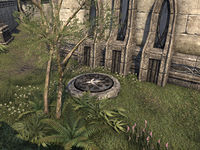
Although they pose little threat, there are a few named NPCs in the area— Curwe, painting on a platform behind the Treasury, Diranor, found leaning against a pillar near the Rededication Shrine, Gannel, praying with an Acolyte on the southwestern side of the Temple, and Uurkar of Auri-El, preaching to two Acolytes near the western entrance. Both Curwe and Uurkar can be killed, but Diranor and Gannel cannot, as they are Friendly: be mindful of this, as they may cause you trouble.
Finally, there are two methods of getting into (and out of) the city, if you have a bounty on your head. The safest way to traverse is through the Outlaws Refuge, which has its inner-city entrance positioned behind the Temple— where this method becomes inconvenient, however, is in its outer-city entrance, which is positioned at the bottom of a waterfall east of Auridon's Event Exchange.
If you are stealthy enough, you can safely come and go from the eastern entrance (where the city Wayshrine is located). There are less guards in the eastern end of Vulkhel Guard because of this, so it is the safest entrance into the desired area if you don't want to jump down the waterfall. All you need to do is hug the walls until you're out of the Guard's vision radius.
Make sure you Bank and Fence as much as possible, to avoid losing all of your progress from getting caught.
Other Methods[edit]
These are other, less used methods of obtaining gold. These can be fairly accessible to newer players, but aren't typically used as a main source of income.
- Questing. Nearly every quest has some sort of physical reward, either gold or items which can be sold. PvE quests generally have a better rate of return for gold than PvP.
- Gold amounts scale to level, so it is recommended for you to hit Level 50 before completing Very High Reward quests.
- Many quests can be repeated, so look for fairly short and easy ones and repeat them over and over for gold and loot.
- Deconstruction. It may be beneficial to destroy low-value items through crafting to gain the raw materials, which can be sold individually for a greater profit.
- Antiquities.
 You can dig for treasure with the Antiquities system, netting you around 250 to 5,000 Gold depending on the Lead.
You can dig for treasure with the Antiquities system, netting you around 250 to 5,000 Gold depending on the Lead.
- Note: Advanced-grade treasures are only obtainable once. Joining the Antiquarian Circle
 is necessary to unlock this feature.
is necessary to unlock this feature.
- Note: Advanced-grade treasures are only obtainable once. Joining the Antiquarian Circle

